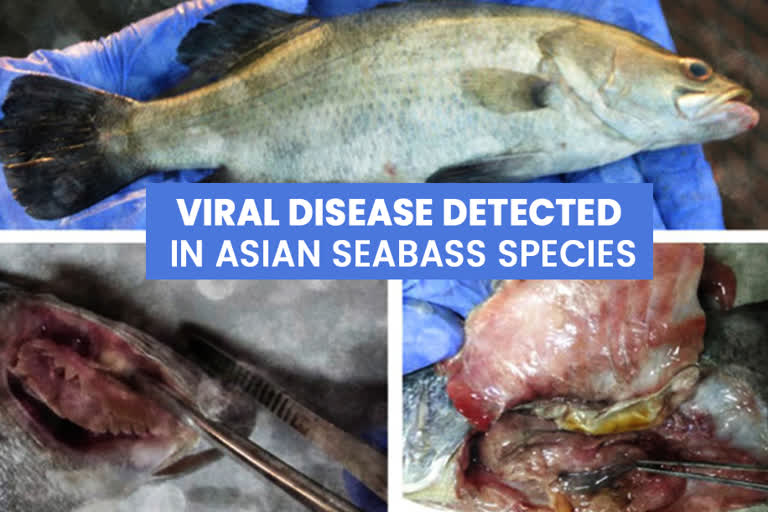Mangaluru: Red Seabream Iridovirus (RSIV) disease, a viral disease that can cause 100 % mortality in more than 30 marine and brackish water fish species, predominantly raised in the aquaculture farms, has been reported in the Western Coast of the country for the first time. A research team from the College of Fisheries at Mangaluru has identified the virus after farmers from Udupi region informed about the mortality of Asian Sea Bass (Lates calcarifer) grown in cages of their aquaculture farms.
According to Dr A Senthil Vel, Dean of the College of Fisheries the fish farmers in the Udupi region informed about the mortality of Asian Seabass (Lates calcarifer) grown in the cages and the same was brought to the notice of the Fisheries College. The disease affected fishes exhibited abnormal behaviour and clinical signs including slow-moving, lethargy, reduced feeding, erratic movement along the sides of the cages.
Pathologists from the College went to the site and collected the samples. Standard procedure was followed to identify the cause of such behaviour in the fish. The laboratory test included microscopic examination, histopathology and molecular-based assays and it was found that the Asian Seabass were infected by Red Seabream Iridovirus (RSIV).
The finding becomes significant since RSIV which was earlier unknown in Indian waters was for the first time identified and isolated in the country, said Senthil Vel.
RSIV was first observed in Japanese cultured red sea bream farm in the 1990s. More than 30 marine and brackish water fish species such as Sea bass, Grouper fish and Red sea bream are known to be susceptible to this virus. The affected fish become lethargic, exhibit severe anaemia, petechiae of the gills, and enlargement of the spleen.
This virus can cause mortality up to 100% depending on host fish species, size, age, water temperature and other culture conditions. The main target organs for RSIV are spleen, kidney, heart, intestine and gill. Since RSIV is a newly emerging virus in Indian waters, proper management measures have to be undertaken to mitigate its spread, the dean mentioned.
Further studies are being carried out in the college and the process of preparing preventive measures for mitigation of the virus is in the progress. However proper scientific management practices can be adapted to control and prevent the spread of RSIV, he added.
The Department of Aquatic Animal Health Management (AAHM) in the College of Fisheries, Mangaluru has been carrying out disease surveillance programme under the “National Surveillance of Aquatic Animal Disease” project in both freshwater and brackish water cultured fishes. The programme was initiated by the National Bureau of Fish Genetic Resources (NBFGR), Lucknow. The prime objective of the project is to create awareness about emerging aquatic animal diseases and preventive measures among the fish farmers in the regions where fish culture and shrimp farming are being carried out in the State of Karnataka through passive and active surveillance.
The team of researchers consisted of Dr Girisha S K, Puneeth T G, Nithin M S, Dr Naveen Kumar B T, Dr Ajay S K, Dr Vinay T N, Dr Suresh T, Dr Venugopal M N and Dr Ramesh K S from the Dept. of Aquatic Animal Health Management (AAHM) of the college.
Also, read: How a nursery owner reconnecting forests along Atlantic coast to aid climate



